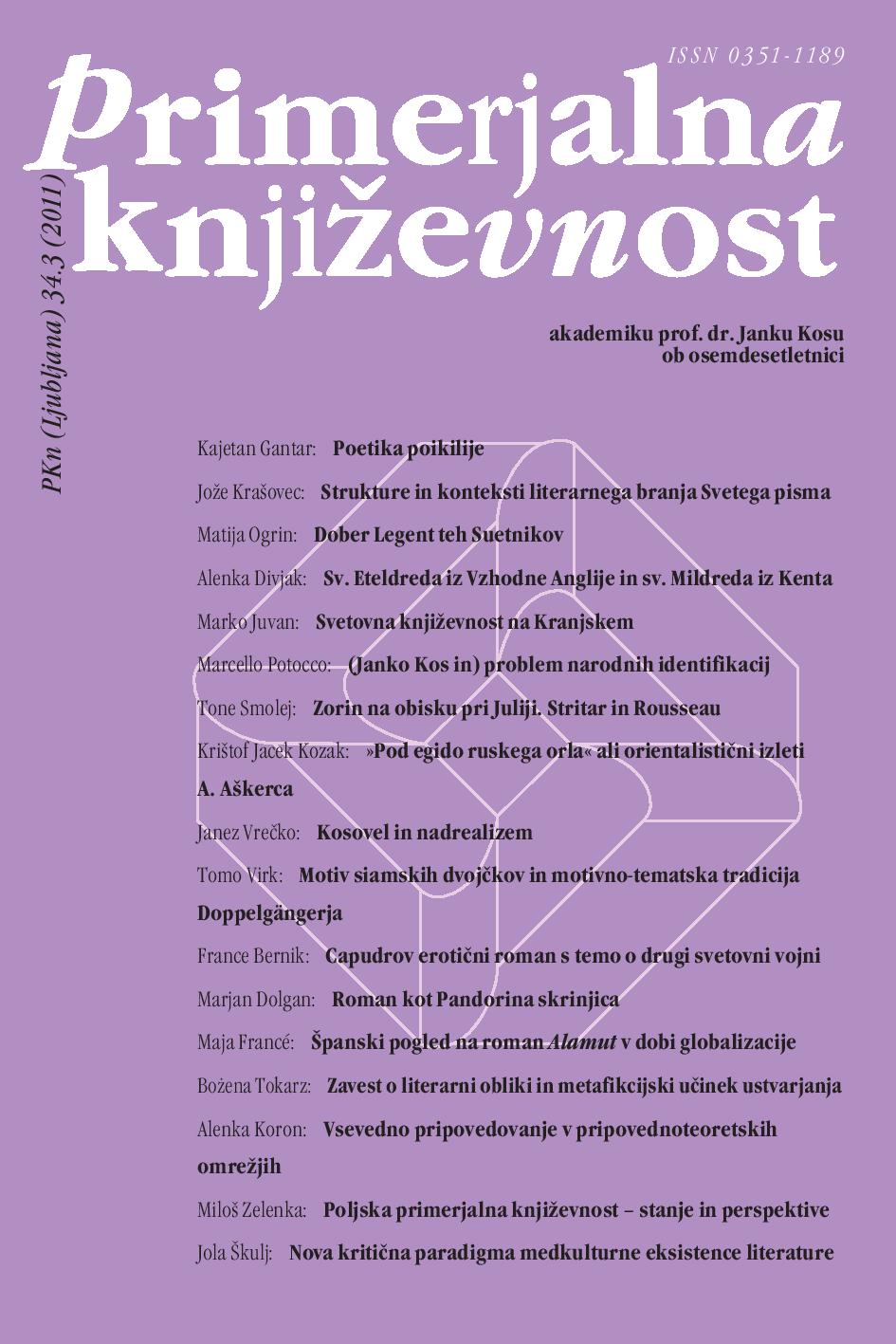“Under the Aegis of the Russian Eagle”: Anton Aškerc’s Oriental Travels
Keywords:
Slovenian literature, travel literature, travel diaries, imagology, Aškerc, Anton, Russia, orientalism, Pan-SlavismAbstract
In the second half of the nineteenth century, after having been made accessible to broad masses, travelling (and tourism) exponentially increased. Among the travelers that were tempted to realize their dreams was Anton Aškerc, a Slovenian poet and priest that was especially drawn to the largest Slavic country, Russia. He travelled there twice, in 1901 and 1902. In order to accurately describe Aškerc’s account, this article’s analysis is based on the fundamental source on Orientalism, Edward Said’s 1978 book of the same name, which has been credited for drawing attention to the Western hegemonic view of the (colonial) Other. The basic questions of this article therefore focus not so much on the truth of Aškerc’s narration as on its objectivity through the discovery of his prejudices and bias. – The basic tenets of the Orientalist approach focus on the relationship between “us” and “them”. In Aškerc’s case, this double-sided rapport became tri-partite and, hence, more complicated. The relationship thus developed between “us” (Slovenians), “them” (the West) and, due to his idealized vision, a third party (i.e., Russia). In terms of his infatuation with Russia, it is not incorrect to claim that Aškerc, having been enraptured by the Russian control over large swaths of land and the possibility of a Slavic language being freely spoken, was a representative of “ecumenical” Pan-Slavism, which accepted Russia as the unifying Slavic power. Yet it is here that his first bias becomes obvious: in praise of the country, he smoothly glosses over, and even supports, its imperial colonialism towards various Asian peoples. Thus, on the one hand, Russia seems to effortlessly win over any other country known to Aškerc. On the other hand, though, even this “pure” relation reveals its flaws. Russia’s sole deficiency is that it does not pay any attention to other western Slavic nations because the Russians do not even bother to ask whether other Slavs exist. – Eventually, when it comes to deciding between western culture and oriental Russia, Aškerc undeniably chooses the former. Hence it is possible to say that, despite his obvious fascination with Russia, despite its place as Arcadia felix, Aškerc realistically sees it as unfit for a “closer” relationship. It is thus possible to claim that his observations may be seen as authoritarian, Eurocentric, and culturally hegemonic, that is, perfectly Orientalist.References
Aškerc, Anton. »Dva izleta na Rusko.« Aškerc, Anton. Med Turki in Rusi. Celje: Celjska Mohorjeva družba, 2006. 73–180.
– – –. »Izlet v Carigrad.« Aškerc, Anton. Med Turki in Rusi. Celje: Celjska Mohorjeva družba, 2006. 23–71.
Baine Campbell, Mary. »Travel Writing and Its Theory.« The Cambridge Companion to Travel Writing. Ur. Peter Hulme in Tim Youngs. Cambridge: Cambridge University Press, 2002. 261–278.
Baskar, Bojan. »Načini potovanja in orientalistično potopisje v avstro-ogrski provinci. Primer Antona Aškerca.« Glasnik Slovenskega etnološkega društva 48.3/4 (2008): 24–35.
Boršnik, Marja. »Aškerčev odnos do Slovanov (ob stoletnici pesnikovega rojstva).« Slavia 25.4 (1956): 594–605.
Carr, Helen. »Modernism and Travel (1880–1940).« The Cambridge Companion to Travel Writing. Ur. Peter Hulme in Tim Youngs. Cambridge: Cambridge University Press, 2002. 70–86.
Dobrovoljc, France. »Odmevi stoletnice Aškerčevega rojstva pri Rusih in Bolgarih.« Aškerčev zbornik: ob stoletnici pesnikovega rojstva. Ur. Vlado Novak. Celje: Odbor za proslavo stoletnice Aškerčevega rojstva, 1957. 182–185.
Herberstein, Žiga. Moskovski zapiski. Ljubljana: Državna založba Slovenije, 1951.
Hulme, Peter in Tim Youngs. »Introduction.« The Cambridge Companion to Travel Writing. Ur. Peter Hulme in Tim Youngs. Cambridge: Cambridge University Press, 2002. 1–13.
Hulme, Peter. »Travelling to Write (1940–2000).« The Cambridge Companion to Travel Writing. Ur. Peter Hulme in Tim Youngs. Cambridge: Cambridge University Press, 2002. 87–101.
Isabel, Vila Maior. »Etre héros en Orient.« Travel Writing and Cultural Memory. Ur. Alziro Seixo Maria. Amsterdam; Atlanta: Rodopi, 2000. 169–179.
Kermauner, Taras. Poezija slovenskega zahoda. Zv. 2. Maribor: Založba Obzorja, 1991.
Kos, Janko. »Anton Aškerc kot potopisec.« Aškerc, Anton. Med Turki in Rusi. Celje: Celjska Mohorjeva družba, 2006. 7–21.
Krysinski, Wladimir. »Voyages modernes et postmodernes : mythe ou réalité des déplacements cognitifs.« Travel Writing and Cultural Memory. Ur. Alziro Seixo Maria. Amsterdam; Atlanta: Rodopi, 2000. 23–33.
Moura, Jean-Marc. »Mémoire culturelle et voyge touristique. Réflexions sur le figurations littéraires du voyageur et du touriste.« Travel Writing and Cultural Memory. Ur. Alziro Seixo Maria. Amsterdam; Atlanta: Rodopi, 2000. 165–280.
Said, Edward W. Orientalizem. Zahodnjaški pogledi na Orient. Ljubljana: ISH Fakulteta za podiplomski humanistični študij, 1996.
Sobe, Noah W. »Slavic Emotion and Vernacular Cosmopolitanism.« Turism: The Russian and East European Tourist Under Capitalism and Socialism. Ur. Anne E. Gorsuch in Diane P. Koenker. Ithaca; London: Cornell University Press, 2006. 82–96.
Zbašnik, Fran. »A. Aškerc: ’Dva izleta na Rusko’; ’Črtice popotnega dnevnika’.« Ljubljanski zvon (1904): 53.


